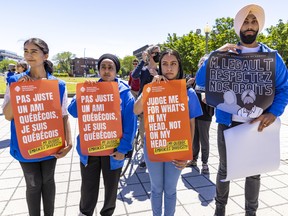Nagar: The fight against racism must be relentless

Article content
An act respecting the laicity of Quebec, or Bill 21, was enacted on June 16, 2019. This act is a law that disproportionately impacts already marginalized people. It bans these Canadians working as civil servants, including teachers, lawyers, police officers and more from wearing religious symbols such as crosses, hijabs, turbans and yarmulkes. This not only affects people currently working in the public sector, but also the youth who aspire to those careers.
This act unfairly targets people who express their faith through what they wear.
Article 6 of the law prohibits wearing “clothing, a symbol, jewelry, adornments, accessories or headwear” that is connected to a religious belief or could be “reasonably considered” as such.
This law is being hotly contested all over Canada. People from the religious minorities who have been forced to choose between career ambitions and religious faith are challenging the law, supported by advocacy groups.
But it’s not just Quebec. Very recently, the City of Toronto apologized to a Sikh organization for a delay in reinstating Sikh security guards let go over a no-beard policy that forced several to choose between their jobs and a key tenet of their faith.
The city will immediately allow for “under-mask beard covers” as a form of religious accommodation for guards at city sites that require N95 respirators.
After a clear public outcry, Mayor John Tory said he believes that no one should be subject to discrimination for their religious beliefs.
Had he really and strongly believed so, it would not have happened in the first place.
Charles Breton of the Centre of Excellence on the Canadian Federation at the Institute for Research on Public Policy observes in one of his articles that there is a perception that French-speaking Quebecers feel they are looked down upon by English-speaking Canadians. He observes the reactions outside Quebec to Bill 21 on religious symbols may have contributed to this feeling.
Premier François Legault’s CAQ party has been setting social rhetoric for its re-election campaign as tradition, family and religion. All these issues are conveniently pooled under the umbrella of secularism, immigration and “Quebec values.” The party has calculated that its advantage lies in conducting political debate against the backdrop of a culture war, real or imagined.
About four separate legal challenges have been brought against Bill 21. The Quebec government has also invoked Section 33, the notwithstanding clause, of the Canadian Charter of Rights and Freedoms. This provision constitutionally insulates law that would otherwise violate certain rights and freedoms guaranteed by the Charter, subject to renewal by the enacting legislature every five years.
It is sad no federal political party has stood up to this law, though every party vows to protect the rights of the minorities.
Federal Public Safety Minister Marco Mendicino in his comments to the Commons public safety committee said, “Canadians must be on their guard for hatred spreading online that can lead to violence, including the race replacement conspiracy theory.”
People must be on guard, no doubt, but can our governments and opposition parties be allowed to remain neutral in the fight against racism?
From the scope of anti-racism initiatives, unfortunately, the concept of social norms is missing. In its report on “Social norms and racism in Canada,” the Environics Institute says a big chunk of Canadians acknowledge the reality of racism in their communities and social circles. The report says this racism has taken many forms, from thoughtless jokes or racist gestures in public and private spaces to derogatory comments on social media or even broad claims that racism simply doesn’t exist.
What is important for the public is they must speak. Social context plays a very important role in the expression of racism. Our institutions such as police forces must come out with race-based data to be used to identify and investigate “specific instances of potential inequitable policing” as well as broader, systemic issues.
People have to keep addressing racism all the time.
Rishi Nagar is the news director at Red FM 106.7 in Calgary, a member of the Calgary Police Service’s Anti-Racism Committee and a member of the senate of the University of Calgary.






Postmedia is committed to maintaining a lively but civil forum for discussion. Please keep comments relevant and respectful. Comments may take up to an hour to appear on the site. You will receive an email if there is a reply to your comment, an update to a thread you follow or if a user you follow comments. Visit our Community Guidelines for more information.